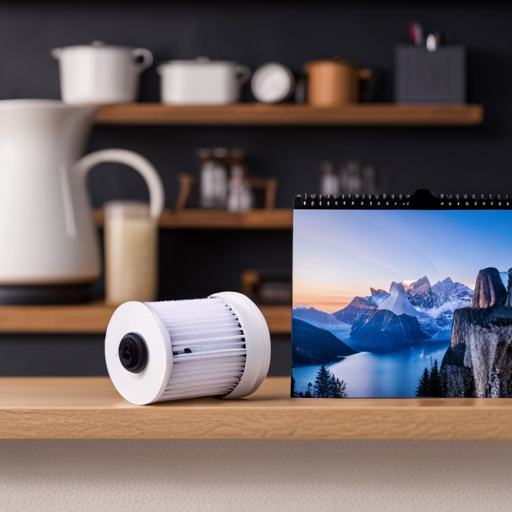Are you tired of constantly replacing your Brita filters? Do you feel like you’re spending too much money on replacements every few months? Well, we have some surprising news for you: Brita filters actually last forever!
That’s right, you can keep using them for as long as you want, as long as you store and care for them properly. Brita filters are designed to remove contaminants such as chlorine, lead, and PFAS from water, and they are made from materials that allow them to last a long time.
Despite this, many people assume that they expire after a certain amount of time or usage, and end up throwing them away and buying new ones. But with the right knowledge and care, you can save money and reduce waste by using your Brita filter indefinitely.
So, let’s dive into the details of how to properly store and care for your Brita filters, as well as how they compare to other brands on the market.
Key Takeaways
– Brita filters do not expire and can last indefinitely if stored properly.
– Unused filters can last indefinitely if stored in their original packaging.
– Brita filters should be stored at room temperature or below 75°F and protected from moisture and airborne contaminants.
– Brita filters have a service life that depends on water quality and usage, with a standard filter lasting 2 months and a Longlast+ filter lasting 6 months.
Filter Lifespan
You may be surprised to learn that the lifespan of Brita filters depends on water quality and usage. Standard filters can last up to two months before they need to be replaced, while Longlast+ filters can last up to six months.
However, factors such as temperature and humidity levels can affect the filter’s lifespan, as well as the presence of contaminants in the air that can reduce the activated carbon’s capacity to filter water.
To ensure maximum effectiveness, it’s recommended to pre-soak older filters in water for 15 minutes before using them. Additionally, it’s important to protect the filter’s packaging from being damaged, as airborne contaminants and moisture can shorten the filter’s lifespan.
By following these tips and storing the filter properly at room temperature or below 75°F and away from direct sunlight or extreme temperatures, you can ensure that your Brita filter lasts as long as possible and provides you with clean and safe drinking water.
Proper Storage and Care
To properly store and care for your Brita filter, make sure it’s protected from moisture and airborne contaminants. Store it at room temperature or below 75°F. Avoid storing your filter in damp or humid areas, such as the bathroom or kitchen sink.
It’s important to keep the filter in its original packaging until you’re ready to use it. This will help prevent exposure to contaminants and ensure that it stays fresh.
In addition to proper storage, there are a few other tips you can follow to get the most out of your Brita filter. For example, be sure to use the filter within a few days of opening it for maximum effectiveness. You should also pre-soak older filters in water for 15 minutes before using them to help ensure that they work properly.
By taking these steps and using your Brita filter as directed, you can enjoy the many benefits of clean, filtered water for years to come.
Comparison with Other Brands
When considering water pitcher filters, it’s helpful to compare Brita with other popular brands like PUR, ZeroWater, Epic, and Clearly Filtered. While all these brands offer similar benefits, Brita stands out for its eco-friendly advantages and cost-effectiveness.
Here’s how Brita compares to other brands:
1. PUR: While PUR filters also offer a long lifespan, their replacement filters are more expensive than Brita’s. Additionally, Brita filters can be recycled through the company’s recycling program, while PUR filters cannot.
2. ZeroWater: ZeroWater filters are known for their ability to remove all dissolved solids from water, but this also means they have a shorter lifespan and need to be replaced more frequently than Brita filters. Additionally, ZeroWater filters are more expensive than Brita filters.
3. Epic: Epic filters offer a similar lifespan to Brita filters, but they are more expensive and not as widely available. Additionally, Epic does not have a recycling program for their filters.
4. Clearly Filtered: Clearly Filtered offers a similar lifespan to Brita filters, but their replacement filters are more expensive. Additionally, Clearly Filtered filters are not as widely available as Brita filters.
Overall, Brita stands out for its cost-effectiveness and eco-friendly advantages, making it a popular choice for households, offices, and travelers.
Conclusion
So, you have it – the surprising truth about Brita filters is that they really do last forever! With the right storage and care, you can use your filter indefinitely, saving you the hassle and expense of constantly replacing them.
It’s important to note that while Brita filters don’t expire, they may become less effective over time, especially if they’re not stored properly or exposed to contaminants.
When it comes to water pitcher filters, Brita isn’t the only brand out there. However, it’s clear they’ve designed their filters to last a long time and effectively remove contaminants from water.
Proper storage and care is key to ensuring your filter continues to work as intended, regardless of the brand.
So, go ahead and pour yourself a refreshing glass of filtered water, knowing your Brita filter will continue to provide clean and safe drinking water for years to come.
